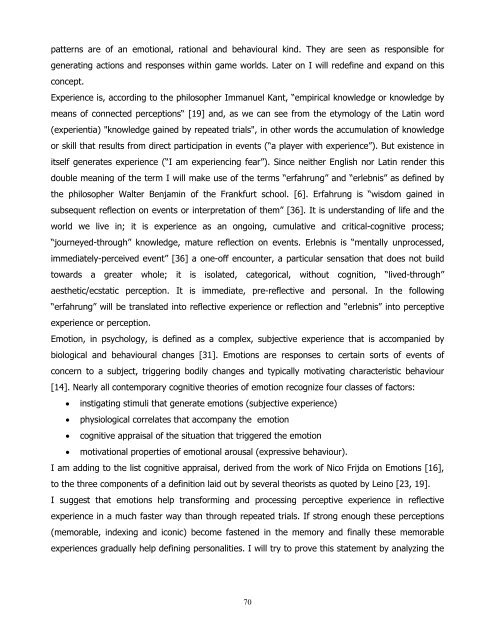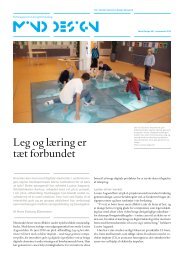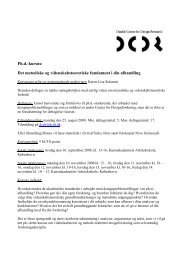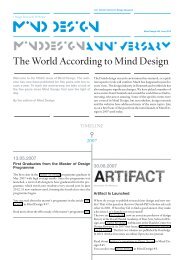Play-Persona: Modeling Player Behaviour in Computer Games
Play-Persona: Modeling Player Behaviour in Computer Games
Play-Persona: Modeling Player Behaviour in Computer Games
Create successful ePaper yourself
Turn your PDF publications into a flip-book with our unique Google optimized e-Paper software.
patterns are of an emotional, rational and behavioural k<strong>in</strong>d. They are seen as responsible for<br />
generat<strong>in</strong>g actions and responses with<strong>in</strong> game worlds. Later on I will redef<strong>in</strong>e and expand on this<br />
concept.<br />
Experience is, accord<strong>in</strong>g to the philosopher Immanuel Kant, “empirical knowledge or knowledge by<br />
means of connected perceptions“ [19] and, as we can see from the etymology of the Lat<strong>in</strong> word<br />
(experientia) "knowledge ga<strong>in</strong>ed by repeated trials", <strong>in</strong> other words the accumulation of knowledge<br />
or skill that results from direct participation <strong>in</strong> events (“a player with experience”). But existence <strong>in</strong><br />
itself generates experience (“I am experienc<strong>in</strong>g fear”). S<strong>in</strong>ce neither English nor Lat<strong>in</strong> render this<br />
double mean<strong>in</strong>g of the term I will make use of the terms “erfahrung” and “erlebnis” as def<strong>in</strong>ed by<br />
the philosopher Walter Benjam<strong>in</strong> of the Frankfurt school. [6]. Erfahrung is “wisdom ga<strong>in</strong>ed <strong>in</strong><br />
subsequent reflection on events or <strong>in</strong>terpretation of them” [36]. It is understand<strong>in</strong>g of life and the<br />
world we live <strong>in</strong>; it is experience as an ongo<strong>in</strong>g, cumulative and critical-cognitive process;<br />
“journeyed-through” knowledge, mature reflection on events. Erlebnis is “mentally unprocessed,<br />
immediately-perceived event” [36] a one-off encounter, a particular sensation that does not build<br />
towards a greater whole; it is isolated, categorical, without cognition, “lived-through”<br />
aesthetic/ecstatic perception. It is immediate, pre-reflective and personal. In the follow<strong>in</strong>g<br />
“erfahrung” will be translated <strong>in</strong>to reflective experience or reflection and “erlebnis” <strong>in</strong>to perceptive<br />
experience or perception.<br />
Emotion, <strong>in</strong> psychology, is def<strong>in</strong>ed as a complex, subjective experience that is accompanied by<br />
biological and behavioural changes [31]. Emotions are responses to certa<strong>in</strong> sorts of events of<br />
concern to a subject, trigger<strong>in</strong>g bodily changes and typically motivat<strong>in</strong>g characteristic behaviour<br />
[14]. Nearly all contemporary cognitive theories of emotion recognize four classes of factors:<br />
• <strong>in</strong>stigat<strong>in</strong>g stimuli that generate emotions (subjective experience)<br />
• physiological correlates that accompany the emotion<br />
• cognitive appraisal of the situation that triggered the emotion<br />
• motivational properties of emotional arousal (expressive behaviour).<br />
I am add<strong>in</strong>g to the list cognitive appraisal, derived from the work of Nico Frijda on Emotions [16],<br />
to the three components of a def<strong>in</strong>ition laid out by several theorists as quoted by Le<strong>in</strong>o [23, 19].<br />
I suggest that emotions help transform<strong>in</strong>g and process<strong>in</strong>g perceptive experience <strong>in</strong> reflective<br />
experience <strong>in</strong> a much faster way than through repeated trials. If strong enough these perceptions<br />
(memorable, <strong>in</strong>dex<strong>in</strong>g and iconic) become fastened <strong>in</strong> the memory and f<strong>in</strong>ally these memorable<br />
experiences gradually help def<strong>in</strong><strong>in</strong>g personalities. I will try to prove this statement by analyz<strong>in</strong>g the<br />
70















